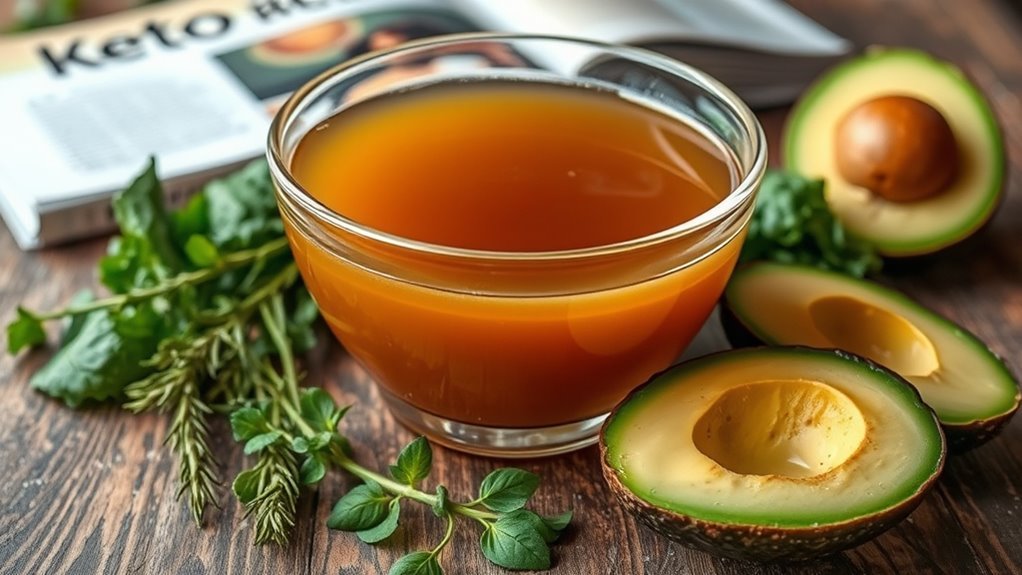Yes, bone broth is definitely keto-friendly! It’s low in carbs, typically containing just 30 to 50 calories per cup. Rich in collagen and essential minerals, it supports joint health and gut function, making it a great addition to your keto meals. Plus, its versatility allows you to use it in soups, stews, or even sip it warm as a snack. There’s plenty more to explore about incorporating bone broth into your keto diet and its benefits for overall health.
What Is Bone Broth?

Bone broth is a nutrient-dense liquid made by simmering animal bones, connective tissues, and sometimes vegetables in water for an extended period. This cooking method extracts essential nutrients, including collagen, amino acids, and minerals, providing numerous health benefits. By incorporating bone broth into your diet, you can support joint health, improve gut function, and boost your immune system. Many people find it easy to integrate into their meals, whether sipping it warm or using it as a base for soups and stews. You can also start making it at home, allowing you to customize flavors while ensuring high quality. Embracing bone broth not only nourishes your body but also enhances your culinary freedom, making it a valuable addition to any health-conscious kitchen.
Nutritional Profile of Bone Broth

When you consider the nutritional profile of bone broth, you’ll find it’s packed with essential nutrients. Its macronutrient composition typically includes a balance of protein, fats, and minimal carbohydrates, making it a great addition to a keto diet. Plus, understanding its caloric content helps you incorporate it effectively into your meal planning.
Macronutrient Composition
While you might think of bone broth as just a warm, comforting beverage, its macronutrient composition reveals it to be a powerhouse of nutrition. A typical serving offers a macronutrient breakdown rich in protein, with minimal carbohydrates and fats, making it an excellent option for those pursuing keto compatibility. The protein content comes primarily from collagen, supporting joint health and muscle maintenance. With negligible carbs, bone broth fits seamlessly into your low-carb lifestyle, providing essential amino acids without disrupting ketosis. This nutrient-dense liquid not only nourishes your body but also enhances satiety, keeping you satisfied longer. So, whether you sip it solo or incorporate it into dishes, bone broth is a versatile ally in your health journey.
Caloric Content Analysis
Although often overlooked, the caloric content of bone broth plays a significant role in its nutritional profile. Typically, a serving size of bone broth (about 1 cup) contains around 30 to 50 calories, depending on the ingredients used and cooking time. This caloric breakdown is primarily derived from protein and trace fats, making it a low-calorie option that fits well within a ketogenic diet. The collagen and amino acids present not only support joint health but also provide a satisfying element to your meals. When you’re seeking a nutrient-dense option without excessive calories, bone broth serves as an excellent base for soups or sauces, allowing you to maintain freedom in your dietary choices without compromising on nutrition.
Benefits of Bone Broth on a Keto Diet

Bone broth offers several compelling benefits for those following a keto diet, making it a valuable addition to your meal plan. Its rich collagen content supports joint health and skin elasticity, essential for maintaining your well-being on a low-carb lifestyle. Additionally, bone broth is packed with essential minerals like calcium, magnesium, and phosphorus, which can enhance your overall nutrient intake. The keto compatibility of bone broth lies in its low-carb nature, allowing you to enjoy it without disrupting ketosis. Studies suggest that the amino acids in bone broth may improve digestion and support gut health, further contributing to your body’s adaptability during your keto journey. Embracing bone broth can empower your health and help you thrive on your chosen path.
How to Incorporate Bone Broth Into Your Meals
Incorporating bone broth into your meals can enhance both flavor and nutrition, making it a versatile addition to your keto diet. You can use it as a base for flavorful soups or keto stews, providing a rich depth that elevates the dish. Consider adding bone broth to sauces for a nutrient boost or using it to steam vegetables, enhancing their taste and health benefits. For quick snacks, sip on warm bone broth or mix it into your favorite dips for added richness. You can also experiment with various cooking techniques, like braising meats, to infuse them with flavor. With these meal ideas, you’ll enjoy nutrient-rich meals that align perfectly with your keto lifestyle.
Homemade vs. Store-Bought Bone Broth
When choosing between homemade and store-bought bone broth, it’s crucial to evaluate the nutritional content and ingredient quality. Homemade versions often have higher levels of nutrients and fewer additives, while store-bought options can vary greatly in both quality and preparation time. Understanding these differences can help you make a more informed choice that fits your keto lifestyle.
Nutritional Content Comparison
While many people enjoy the convenience of store-bought bone broth, it’s essential to compare its nutritional content with that of homemade versions to understand which option may better support your keto diet. Homemade bone broth typically boasts higher nutrient density, offering a rich source of collagen, amino acids, and minerals that can promote joint health and gut integrity. In contrast, store-bought varieties might contain added preservatives and flavorings, which can dilute their health benefits. Moreover, the cooking time for homemade broth allows for a more extensive extraction of nutrients. By making bone broth at home, you’re empowered to tailor its nutritional profile, ensuring it aligns with your dietary needs while fully reaping the health benefits that this nourishing staple provides.
Ingredient Quality Differences
Although both homemade and store-bought bone broth can be beneficial, the quality of ingredients used can greatly impact their overall nutritional value. When you make your own broth, you have complete control over ingredient sourcing, allowing you to select high-quality bones, ideally from grass-fed or pasture-raised animals. This not only enhances the flavor but also maximizes nutrients like collagen and amino acids. On the other hand, store-bought options can vary considerably; some might contain additives or low-quality ingredients. Choosing organic options can help guarantee that you’re getting a cleaner product. Ultimately, prioritizing ingredient quality empowers you to make informed choices that align with your health goals, especially on a keto diet.
Preparation Time Factors
Preparing bone broth can vary greatly in time commitment depending on whether you choose to make it at home or opt for store-bought options. If you’re up for the challenge of homemade broth, you’ll enjoy the benefits of nutrient density and flavor customization, though it can take several hours or even days. Here are some preparation tips to take into account:
- Control your ingredient quality for maximum health benefits
- Experiment with different cooking methods for unique flavors
- Enjoy the satisfaction of creating something nourishing from scratch
- Embrace the freedom of adjusting recipes to fit your dietary needs
On the other hand, store-bought options save you time but might compromise on nutrients. Weigh your priorities, and choose what best fits your lifestyle.
Potential Drawbacks of Bone Broth on Keto
Even though bone broth is often touted as a nutrient-rich addition to a ketogenic diet, there are potential drawbacks that you should consider. One significant concern is its high sodium levels, which can lead to increased blood pressure and dehydration if consumed excessively. While sodium is vital for electrolyte balance, too much can counteract the benefits of a keto diet. Furthermore, while bone broth may support gut health, it’s not a complete source of nutrition. Relying heavily on it might cause nutrient imbalances, as it lacks sufficient protein and fiber. Consequently, while bone broth can be a flavorful component, it’s crucial to consume it mindfully and ascertain your diet includes a variety of other nutrient-dense foods for overall health.
Recipes Featuring Bone Broth for Keto Enthusiasts
While it’s important to be mindful of bone broth’s potential drawbacks, it can still be a delicious and nutritious addition to your keto meals. The bone broth benefits, such as improved gut health and enhanced joint support, make it a fantastic base for various keto recipes. Here are some to try:
Bone broth offers delicious nutrition for keto meals, supporting gut health and joints while enhancing your favorite recipes.
- Creamy bone broth soup with spinach and mushrooms
- Savory bone broth risotto using cauliflower rice
- Spicy bone broth chili with ground beef and peppers
- Rich bone broth stew filled with your favorite low-carb veggies
These recipes not only elevate your keto experience but also allow you the freedom to enjoy hearty, satisfying dishes while staying on track with your health goals.
Frequently Asked Questions
Can Bone Broth Be Used as a Meal Replacement on Keto?
Sure, you can sip on bone broth and call it a meal replacement, if you’re into that sort of culinary magic! But let’s be real, its nutrition might not fill you up like a hearty dish. While it’s low in carbs and rich in nutrients, it’s best for meal timing rather than a full meal. For true satiety, consider adding proteins or fats alongside that broth, keeping your keto game strong and satisfying!
Is Bone Broth Suitable for Intermittent Fasting During Keto?
Yes, bone broth can be suitable for intermittent fasting during your keto diet. It’s low in calories but packed with nutrients, making it a great option to help you stay nourished while fasting. The collagen and amino acids in bone broth support gut health and may curb hunger, allowing you to maintain your fasting window. Just be mindful of the sodium content, as it can vary by brand. Enjoy the freedom bone broth brings to your fasting routine!
How Long Can I Store Homemade Bone Broth?
You can store homemade bone broth in the refrigerator for about 4 to 5 days. For longer shelf life, consider freezing it in airtight containers or ice cube trays, where it can last up to 6 months. To maintain its nutrients and flavor, make sure it’s cooled properly before storing. These storage tips will help you enjoy your broth while preserving its health benefits, allowing you the freedom to savor it whenever you want.
Does Bone Broth Contain Any Carbohydrates?
Bone broth typically contains minimal carbohydrates, usually less than 1 gram per serving. This makes it a nutritious option for those seeking to maintain a low-carb diet. Beyond its low carb content, bone broth is celebrated for its health benefits, particularly its high collagen content, which supports joint and skin health. With its rich nutrient profile, you can enjoy its savory flavor while fueling your body with essential nutrients without compromising your dietary goals.
What Types of Bones Are Best for Making Bone Broth?
For making bone broth, beef bones are excellent for rich flavor and collagen, while chicken bones provide a lighter, nutrient-dense option. Pork bones add depth and a slightly sweet taste, making your broth unique. If you’re looking for something different, fish bones create a delicate broth packed with omega-3 fatty acids. Each type brings its own benefits, so experimenting with them can enhance your broth’s nutritional profile and flavor.
Frequently Asked Questions about Bone Broth and Keto Diet
1. Is bone broth keto-friendly?
Yes, bone broth is keto-friendly. It is low in carbohydrates and high in nutrients, making it a great addition to a ketogenic diet. Bone broth is primarily made from animal bones and connective tissues, which provide collagen, gelatin, and essential minerals without adding significant carbs.
2. How many carbs are in bone broth?
Bone broth typically contains less than 1 gram of carbohydrates per cup, depending on the recipe and ingredients used. This low carb content makes it an excellent choice for those following a keto diet, as it won’t disrupt ketosis.
3. What are the health benefits of bone broth on a keto diet?
Bone broth offers numerous health benefits, especially for those on a keto diet. It is rich in collagen, which supports joint health and skin elasticity. Additionally, it provides essential amino acids, promotes gut health, and aids in hydration. The minerals found in bone broth, such as calcium and magnesium, also support overall wellness and can be beneficial in maintaining electrolyte balance on a low-carb diet.
4. Can I consume bone broth every day on a keto diet?
Yes, many people on a keto diet consume bone broth daily. It can be used as a base for soups, stews, or enjoyed on its own as a warm beverage. However, it’s important to maintain a balanced diet and not rely solely on bone broth for nutrition, ensuring you are also getting a variety of other nutrients from meats, vegetables, and healthy fats.
5. Are there any specific types of bone broth that are better for a keto diet?
While any homemade or store-bought bone broth can be keto-friendly, those made from grass-fed or pasture-raised animals are often preferred due to their higher nutrient content and better omega-3 fatty acid profiles. Additionally, opting for bone broths that contain a variety of bones, including joints and cartilage, can increase the collagen and gelatin content, enhancing the health benefits while remaining low in carbs.
References
- https://www.ncbi.nlm.nih.gov/pmc/articles/PMC6470831/
- https://www.healthline.com/nutrition/bone-broth-benefits
- https://www.webmd.com/diet/what-is-bone-broth
- https://www.ncbi.nlm.nih.gov/pmc/articles/PMC6822056/
- https://www.atlantic.edu/health/docs/bone-broth.pdf
- https://www.jamanetwork.com/journals/jama/fullarticle/2768072
- https://www.clevelandclinic.org/health/diseases/17780-bone-broth


